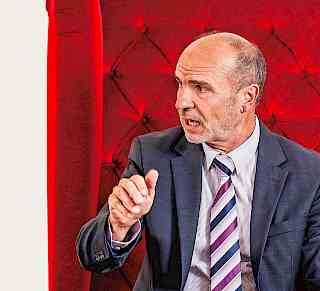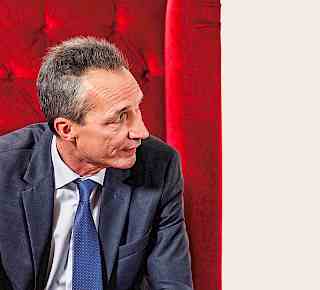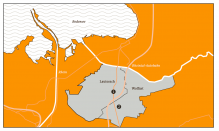Michael Wohlgenannt and Willibald Nigsch in conversation
"At that point I’m done with harmony"
Issues
Text
Pictures
Lukas Hämmerle
Tags
The two Gebrüder Weiss locations in Lauterach and Wolfurt are separated by a mere mile. More than enough reason to ask the two brand managers Willibald Nigsch (Wolfurt) and Michael Wohlgenannt (Lauterach) about the dividing line between comradeship and competition.
At Gebrüder Weiss management meetings, you and your colleagues from the West region can always be seen sitting at the same table. Are appearances deceiving, or do you really get along so well, despite the rivalry between you?
Michael Wohlgenannt: Friendship is a matter of perspective. But I would agree that we have a friendly relationship. That's probably because we have a long history of shared success in the region, so envy doesn't really come into play.
Willibald Nigsch: But there's another more practical explanation as well. Mr. Mayr (the manager in Hall/Tirol) always arrives at conferences two hours before anyone else, and lays claim to the seats for us. Otherwise I could imagine sitting at a different table for a change. (laughs)
But relations between your predecessors is supposed to have been anything but harmonious.
MW: That's true enough. But it was a very different world back then. There was much more pressure on them to compete.
WN: As a man of his times, my predecessor naturally embraced a different management style. The profit-center mentality in the locations was far more intense than today, and the rivalry was all the fiercer. We still operate as a profit center – but within a framework of overriding corporate goals and structures – and are managing very nicely.
What brought about this different approach?
WN: Commerce has changed considerably in recent decades. Today things are much more interconnected than they used to be, so even service providers need to have good working relations if they want success. The benefits of a constructive partnership are too apparent for them to be questioned anymore.
How would you describe the rapport between you?
MW: As a good working relationship.
WN: Right, in the sense that we accept each other and also respect each other's work. We have shared targets we are working towards – that helps too. In recent years we have made fundamental changes to the Vorarlberg region and reorganized things to keep them functioning smoothly during the next few years.
So the right structure was a factor in your good working relationship?
WN: Exactly. Our branches aren't competing as intensely as before. Today their portfolios complement each other. We're both happy to have the other one at our side.
Nevertheless: stable personal relationships are vital if you are creating shared structures and pursuing common goals.
MW: The circumstances really are unusual. Willi and I have been at the company for decades. And we've also spent years and years together in management. So we've had plenty of chances to forge mutual trust.
WN: And the confidence we have in one another isn't limited to the two of us working together. It spreads to both our departments as well. If there's no animosity, our two teams can post the results we want quickly.


What do you like about each other?
MW: What I like about Willi is his technical expertise and his many years of experience in shipping and management. You know exactly what he's going to do, he's predictable – and I mean that in a positive sense. Put simply, I always know where I stand with him.
WN: Michael has a straightforward way of talking about things. And technically speaking we are on the same wavelength too. Like me, he has been in freight forwarding for over 40 years. I also appreciate the style of management he employs at his site. We're totally different in that respect.
What do you mean?
WN: I talk a bit more, I like to foster harmony and always try to make sure that everybody is happy with a situation.
In other words, Michael doesn't communicate, doesn’t care about harmony and puts the pressure on to get things done. Right?
MW: I would put it differently. I call a spade a spade, plain and simple – and I don't like beating around the bush. If our managers spend weeks talking around the same subject, I’m done with harmony.
What bothers you about the other person?
MW: Nothing really. And that's not mere flattery. But I'd have to think back to know whether that has always been the case.
WN: We found a mode of working together and accepting each other for who we are. Since we haven't changed much over the years, things have run smoothly for a long time. I'd have to say, though, that I don't impose lots of different expectations on Michael – beyond the fact that he continues to post good results.
And if the results are less good at some point?
WN: Well, he'd know about it from me straight away! We'd have to sit down and talk things through. Of course the same also applies to me. We both depend on the other doing a good job. All of our earnings end up in the same pot. We expect from each other what our boss expects of us. We always keep an eye on each other. As long as the numbers add up, everybody's happy.
Have there been any crises along those lines?
WN: Needless to say, the 2008-2009 crash hit us both equally hard. But even then we reached a joint decision not to make anyone redundant, despite the nosedive in earnings. Today we are reaping the rewards of that decision, and are stronger than ever as a result.
If you were to swap roles for a day, what would you do?
MW: Well, I would take a good hard look at his other sites. I'm really not very familiar with Feldkirch and Bludenz at all. And you?
WN: I know all I need to know about your sites. I suspect I'd be more interested in communicating. I'd talk to your people, ask them how things are going, where the shoe pinches.
Is there anything that you envy about your colleague?
WN: From my perspective as a shipping guy, Mr. Wohlgenannt's remit is a little more interesting than mine; that’s due to the international land transport services. I'm responsible for domestic land transport and suspect I would really enjoy working more closely with international partners – although I'm aware that, given the product management angle, these operations are much more highly regulated than they used to be.
MW: I envy Willi more because he gets to work with GW offices most of the time. Cooperating with the different partners from other countries is genuinely enjoyable and interesting, but integrating them all brings some major headaches. The IT interfaces need to be right, the systems need to be compatible. I don’t think you face these obstacles if you are working mainly within the GW organization.


On a more personal note, which of you has the more attractive working environment?
MW: Well, Willi's office is more modern. I have solid wood. But I wouldn't say one is better than the other.
WN: But I look out at the mountains, so I have a better view!
MW: You can't say that! I have a perfect panorama of our headquarters. What could be better than that?
WN: A black block. Twelve meters high. OK. (laughs)
Do you spend time together off the job as well?
MW: Not really. Sometimes we go to soccer games in Altach, or watch the Bulldogs play ice-hockey in Dornbirn.
WN: But not on a regular basis. When our apprentices have their graduation ceremonies, we attend together with our ladies.
MW: Our wives have already met at various birthday parties.
Watching soccer together, mutual invitations – that doesn't exactly sound like you’re avoiding each other.
Both: No, no, it’s not that…
WN: ...but actually we don't have that much in common. He rides a motorcycle. I don't enjoy that. I drive a convertible. He doesn't like that.
MW: He goes skiing in Canada. That wouldn't be my thing. I'm not the big globetrotter. I'm OK with everything that I can reach on my motorcycle.
What kind of person do you need to be to be accepted and successful at Gebrüder Weiss?
MW: What makes working at Gebrüder Weiss so special is the free hand you have. Everyone gets the chance to contribute their own ideas here. You have the feeling that people trust you from day one. And if you make a success of things, you can continue to work on your own initiative without too many interventions from on high. That works as a motivator. Despite being part of a major company, you get plenty of scope for free enterprise.
WN: That's correct. What’s more, as entrepreneurially-minded branch managers we benefit from the company's strategies and policies. The Gebrüder Weiss network has been expanding rapidly for over 20 years now. Our export-oriented customers in Vorarlberg appreciate the fact that we have our own branches in all of their destinations worldwide.
Gebrüder Weiss has just opened a raft of new locations in Asia and the United States. In your view, how will this change the company?
MW: To me this expansion is simply the next step in our development over the past years. And the timing is right because the company is stable, with strong foundations. In my view, the corporate culture won't change that much.
WN: Giving capable regional managers a lot of latitude to make decisions is part of the Gebrüder Weiss formula for success. If we can maintain this approach, we will continue to enjoy success in future – in Vorarlberg and every other part of the world.
Frank Haas is head of brand strategy and communication at Gebrüder Weiss and editor-in-chief of Atlas.










